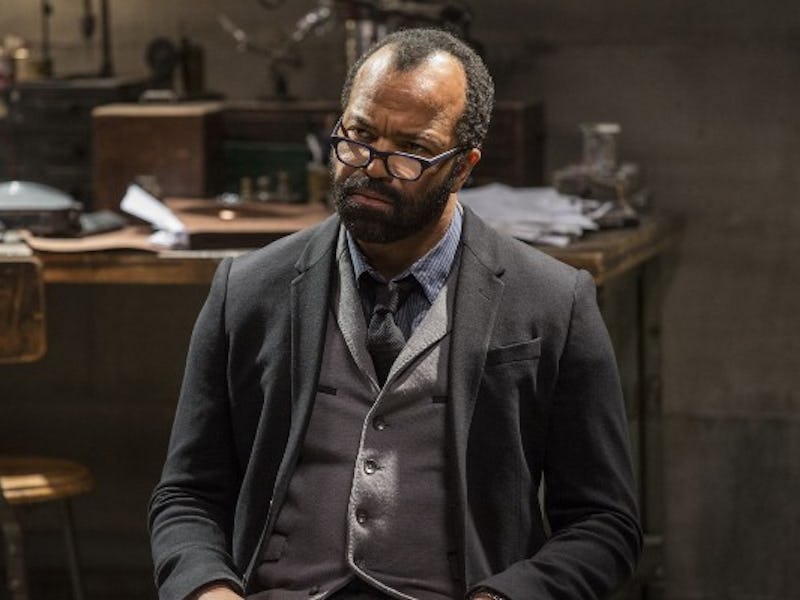We Finally Learned What the Hell Motivates Dr. Ford in 'Westworld'
"The Well-Tempered Clavier" proved that Robert Ford is more human than god.

As HBO’s Westworld nears its first season finale, the show’s thematic mysteries are gradually coming into focus after eight weeks of an intentionally disorienting plot that allowed for incessant fan theories.
In “The Well-Tempered Clavier,” we move past the revelations of the previous episode — Bernard is a robot! — and really get to sit with the true meaning of the human and host relationship. Bernard forces Ford to help him plumb the depths of the circuits in his brain to meet the real Arnold, and he confronts the transcendental moment that gives his fabricated life its meaning. But we, along with Bernard, want to know: Whats the difference between feeling actual emotional pain and being programmed to feel that pain?
It turns out Bernard, in fact, is Arnold. Or, more specifically, he’s a simulacrum of Arnold built by Ford following his former partner’s death some 30 years prior. And it wasn’t easy for Bernard to get this important bit of information. “Are they real, the things I experienced? My wife? The loss of my son?” Bernard wonders aloud in “Trace Decay,” before digging deeper in this episode.
Through trippy flashback scenes from earlier episodes, Bernard takes a trip down the rabbit hole of his locked away digital memories while holding Ford at gunpoint. It’s there we relive the trauma that has driven Bernard. The death of his son Charlie is a “cornerstone memory,” the backstory detail that defines his entire persona.
The concept of “Cornerstone Memories” was first introduced what seemed to be a throwaway line in “The Stray,” when Stubbs and Elsie are out hunting for the AWOL Woodcutter. “Backstories do more than amuse guests; they anchor the hosts,” she tells Stubbs, the park’s head of security. “It’s their cornerstone. The rest of their identity is built around it, layer by layer.”
Bernard’s cornerstone trauma goes beyond mooring him to some sort of basic motivation, which worked for a time. Whereas most hosts are given some sort of basic persona-building detail, like Teddy wanting to avenge Dolores against whoever wanders into her narrative loop, it’s obviously much deeper and more complicated with Bernard and Ford. Bernard’s son isn’t a reflection of Arnold’s life, he was a fabrication by Ford to keep his sentient creation in line so he wouldn’t get to the point of truly questioning his current reality.
In a poignant juxtaposition, Bernard’s surreal flashback freak out includes him pondering Maeve, who killed herself so she could avoid having the memories of her daughter’s death erased. “This pain, it’s all I have left of her,” she says before ending her life for the millionth time. Maeve has already pulled back the facade of the park, and Dolores is more than on her way to do so as well. It’s no coincidence that all three have wrestled with the implanted grief over the deaths of loved ones to become self-aware by using the same repeated phrasing. “The pain, their loss, it’s all I have left of them,” Dolores says of her parents in “Dissonance Theory.” “This pain, it’s all I have left of him,” Bernard said of Charlie in “Trace Decay.”
But Ford was so let down by losing his friend and rival — we also find out the real Arnold was killed by Dolores, no less — that he built a replica of him in order to to continue the kind of utopian creative freedom that typified the park’s early years. This gives all of Ford’s previous bloviating and ominous literary allusions even more of a tragic spin. He can quote romantic poets all he wants, but it seems Arnold’s death is Ford’s own cornerstone memory, one that’s pushing him to madness with his new narrative.
Because Bernard confronted and surpassed his defining cornerstone memory (which is fake), he forces Ford to confront his own, which he doesn’t want to admit is very real. Ford is the self-proclaimed god of the park, but his actions in creating a host version of Arnold only prove his undeniable human fallibility. He ostensibly created Bernard out of a sense of loss and sadness, which in turn spawned his increasingly unstable sense of omnipotence. And what’s more human than a power trip like that?
The ending of “The Well-Tempered Clavier” makes it seem like Ford beat Bernard at his own game by forcing him to kill himself in the cold storage facility. But if Westworld has taught us anything it’s that no one, real of fake, ever stays dead. The impending robot uprising in the park will force everyone there to confront their cornerstone memory and decide on who to trust. But as the all-powerful Ford says in Episode 9, “Never place your trust in us. We’re only human.”